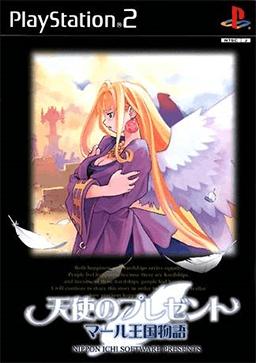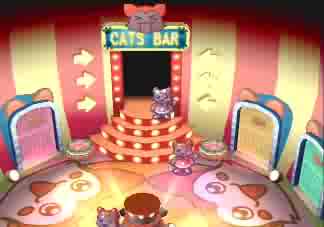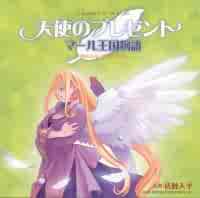Tenshi no Present: Marl Ōkoku Monogatari
| Tenshi no Present: Marl Ōkoku Monogatari | |
|---|---|
 | |
| Developer(s) | Nippon Ichi |
| Publisher(s) | Nippon Ichi |
| Composer(s) | Tenpei Sato |
| Platform(s) | PlayStation 2, PlayStation Network |
| Release date(s) |
PlayStation 2
PlayStation Network
|
| Genre(s) | Role-playing video game |
| Mode(s) | Single player |
Tenshi no Present: Marl Ōkoku Monogatari (天使のプレゼント マール王国物語) is a Japanese 2000 role-playing video game from Nippon Ichi.[1] This is the first Marl Kingdom game for the PlayStation 2. Unlike the previous games in the series, this game was only released once, although a special limited edition version of the game was released concurrently.[2]
Instead of the 2D graphics of the other Marl games, Tenshi no Present uses 3D backgrounds. However, the character sprites themselves are kept 2D, much like many other Nippon Ichi games released afterwards.[2]
Story
Tenshi no Present, unlike the earlier games in the series, consists of six separate chapters, each of which features different characters from the Marl Kingdom series.[2] The chapters take place in various times before or after the stories of Rhapsody and Little Princess. These chapters often address unanswered questions from the earlier games, or provide additional insight into the characters.
Chapters
- Chapter One: The first chapter is set early in Cornet's adventure in Rhapsody: A Musical Adventure. Set after Ferdinand has been turned to stone, but before Cornet sets off on her quest to save him, Cornet gets lost in a forest. She, Kururu and Etoile end up in Eringa Village, where they decide to find a young girl's missing mother. This was one of two scenarios that was supposed to be included in the DS remake of the original game, but was ultimately left out.
- Chapter Two: The second chapter takes place four years after Little Princess. Kururu, now sixteen, has decided to marry Cello. In order to get her father to accept Cello as a suitable husband, she has to win the next Miss Marl Kingdom competition. Cello and Crea aid her in this task. This serves as an epilogue to Little Princess. In this chapter, it is heavily implied that Kururu and Cello will eventually be the parents of Homard from La Pucelle: Tactics.
- Chapter Three: The third adventure is not set in any particular time. The Nyankos of the Marjoly Family have gone missing, and the four women set out to find why they have disappeared.
- Chapter Four: The fourth chapter takes place immediately before the events in Little Princess. Pekonyan, a servant of the Akurjo Family, is in love with Pokonyan, a Nyanko for the Marjoly Family. Pekonyan is distraught when she realizes that the Akurjo Family is going to war with the Marjoly Family, and decides to assassinate Akurjo before this happens.
- Chapter Five: The fifth and longest chapter in the game takes place thousands of years before any of the Marl Kingdom games, in the legendary Kingdom of the Ancients and, due to its length, is the only chapter in the game to be broken into multiple sub-chapters. This chapter follows Cherie's life from start to finish. It starts with her as a princess in the era of the Ancients, and follows her through her arrival in the future, her marriage, the birth of Cornet, and her eventual death. This was one of two scenarios that was supposed to be included in the DS remake of the original game, but was ultimately left out.
- Chapter Six: The sixth chapter is the "bonus" chapter. In this chapter, every single playable character from every chapter is brought together, regardless of when or where their stories took place. All of them join together to defeat the Terrible Overlord once and for all.
Gameplay
Tenshi no Present is a typical RPG, complete with experience points, parties of characters, and spell casting. In each chapter, the player guides different characters through their adventure, engaging in several battles along the way.

Battle
The battle system is completely different from earlier Marl games. The player's party consists of up to 12 characters divided into rows of 4.[3] The player can only have direct control of the row leaders. The other characters in each row, called "partners," cannot normally be controlled and attack randomly.[2] The only characters that can be controlled even when they are not in the front row are puppets, and they can only be controlled by Cornet, Cello, Kururu or Cherie.
The party consists of humans, puppet users, puppets and monsters. Each character, when acting as a partner, will raise or lower the statistics of the row leader. Depending on party organization, special attacks can be unlocked for the row leader.
Instead of paying for spells like in Little Princess, the characters use SP for spell casting.[2]
Legacy
Along with Rhapsody: A Musical Adventure and Little Princess: Marl Ōkoku no Ningyō Hime 2, this game is part of the Marl Kingdom series created by Nippon Ichi. It is also the prequel to the later Nippon Ichi game La Pucelle: Tactics. Although released on a different system with a new battle system, Tenshi no Present maintains many of the themes of the previous games. The graphics remain bright and colorful, but backgrounds are now in 3D.[2]
There is an active forum on NIS America requesting Marl Ōkoku no Ningyō Hime 2 and Tenshi no Present - Marl Oukoku Monogatari on the NIS request forum. It is believed that with enough support the games will be licensed, but NIS Americas response is currently unknown.
Soundtrack
A soundtrack of the game's song was released on February 21, 2001.[4] Like the other Marl games, the music was composed by Tenpei Sato.

Tracks:
- Girls, to Arms
- Orange Village
- Baby Bird
- Dreaming Cat
- Because We Will Always be Together
- Overture
- Sabato
- Dream Traveler
- I am a Cat that Lives for Love
- Called by the Darkness
- One Day, We Will Meet
- Boy on the Ring
- A World Made Just for Us
- Eringa Valley
- I Don't Believe in Unrequited Love
- Closed Space
- Cubist Freezer
- Miss Marl's Kingdom Contest
- Who's Crying Now?
- The War-Maiden Smiles
- Footsteps of Terror
- Emergency
- Arabian Beast - The Great and Terrible Wizard King
- Thank You
References
- ↑ http://www.gamespot.com/ps2/rpg/tenshinopresentmarleomle/index.html Retrieved 2007-11-7
- 1 2 3 4 5 6 Kurt Kalata. Marl Kingdom at Hardcore Gaming 101. Retrieved 2007-10-7
- ↑ http://www.rpgamer.com/news/Q4-2000/121700b.html Retrieved 2007-12-7
- ↑ http://www.rpgfan.com/soundtracks/puppet-3/index.html Retrieved 2007-11-7
External links
| ||||||